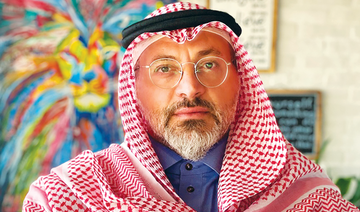RIYADH: Saudi Arabia is fast emerging as a global hub for startups and entrepreneurs as the Kingdom continues to undertake massive diversification activities under Vision 2030, throwing open new opportunities for innovative ideas and businesses to flourish.
The Global Entrepreneurship Congress, or GEC, which opens next week on March 27 in Riyadh, is one of those platforms that young talents and rising entrepreneurs from across the world will be gathering on to tap into the Kingdom’s burgeoning startup market.
Saudi Arabia was chosen to host the event as it ranked first out of 45 countries, with Riyadh ranking one of the top five regional cities based on startup ecosystem performance, according to startup ecosystem research firm Startup Genome.
The four-day event will host 150 speakers comprising top policy makers, investors, business founders and CEOs, including Steve Wozniak, co-founder of Apple and Marc Randolph, co-founder of Netflix.
Technology is the driver of the world, and Saudi Arabia is already one of the largest potential markets in MENA in terms of ICT
Egyptian entrepreneur and founder of tech startup DevisionX, Mahmoud Abdelaziz
Startup ecosystem
Entrepreneurs from across the world are eyeing Saudi Arabia as the country is witnessing a major shift in its economy, driving the Kingdom’s startup ecosystem.
Saudi Arabia has seen a 54-percent increase in startup funding deals in 2021 compared to 2020 and accounted for 23 percent of all funding in the MENA in 2021, according to a report by data platform MAGNiTT.
One of the countries to have successfully unlocked these funding deals with Saudi Arabia is Egypt, as both the nations share immense market opportunities for the startup ecosystem.
“Technology is the driver of the world, and Saudi Arabia is already one of the largest potential markets in MENA in terms of ICT,” said Egyptian entrepreneur and founder of tech startup DevisionX, Mahmoud Abdelaziz, in an interview with Arab News.
HIGHLIGHTS
• Saudi Arabia was chosen to host the event as it ranked first out of 45 countries, with Riyadh ranking one of the top five regional cities based on startup ecosystem performance, according to startup ecosystem research firm Startup Genome.
• The four-day event will host 150 speakers comprising top policy makers, investors, business founders and CEOs, including Steve Wozniak, co-founder of Apple and Marc Randolph, co-founder of Netflix.
He will be attending the GEC to connect with investors and build partnerships.
“There will be a huge contribution from the Saudi Vision 2030 as well to lead the digital transformation in the region by supporting deep tech startups through investment and market opportunities,” Abdelaziz added.
As Egypt is taking major steps under its 2030 initiatives, the country’s entrepreneurial ecosystem performance has been witnessing growth over the past years.
This puts local entrepreneurs in a better position to explore opportunities within Egypt and other regional countries, including Saudi Arabia.

Omar Hagrass, Trella founder
Trella is extremely optimistic and committed to the future of Saudi Arabia. The Kingdom’s economy is diversifying and seeking to use the latest technologies.
Trella founder Omar Hagrass
Saudi-Egypt startup deals
Egyptian entrepreneurs have been heading to Saudi Arabia for funding and expansion plans, whereas many Saudi-based companies are doing the same in Egypt.
For instance, Egypt-based logistics startup Bosta recently announced its expansion plans in Saudi Arabia after raising a series B funding.
“Being a focal area with a large economy and high e-commerce activity, the Saudi freight and logistics market’s attractiveness is gaining the attention of startups and investors,” Co-founder of Bosta Mohamed Ezzat said in a statement.
The sentiment is also echoed by many other logistics startups like Trella, who are executing expansion plans in the Kingdom.
Cairo-based digital freight marketplace Trella, which started operations in Egypt back in 2018, expanded its operation into the Kingdom and then raised $42 million in its last funding round that was co-led by Saudi-based venture capital Raed Ventures.
“Trella is extremely optimistic and committed to the future of Saudi Arabia,” the founder Omar Hagrass told Arab News, adding that “the Kingdom’s economy is diversifying and seeking to use the latest technologies.”
He said that major international companies are investing large amounts of capital in the Kingdom’s market.
“All of this complements the Saudi 2030 Vision to fuel business growth and attract investment; this all bodes well for entrepreneurship in the country,” added Hagrass. Founder partner at Raed Ventures, Omar Al-Majdouie, said in a statement that Trella’s growth is a combination of the founders’ experience and a “booming freight sector.”
While the Kingdom’s freight sector is witnessing growth with fresh startups from Egypt entering the market, other sectors such as e-commerce are also recording increased activity with acquisitions happening across both countries.
Saudi Arabia’s B2B e-commerce marketplace, Sary, has recently announced the acquisition of Egypt-based e-commerce platform, Mowarrid.
The acquisition is part of Sary’s expansion plan into the North African market, starting with Egypt, the second-largest economy in Africa.
“Egypt is a strategic market for us and has a huge synergy with the Saudi and GCC markets,” Mohammed Al-Dossary, CEO and co-founder of Sary, said in a statement.
Saudi Arabia and Egypt share the stage of the entrepreneurial ecosystem as both countries recorded the highest number of investment deals in the MENA region, with 15 and 11 deals, respectively, in January 2022.
Saudi Arabia startups raised $219 million in February alone, accounting for over half of the total $375 million funding raised in the MENA region, according to a report by Wamda.
As it looks like the sky is the limit for startups and entrepreneurs eyeing the Saudi market, deal sizes are only expected to rise in the coming days, with regional countries like Egypt set to ride on the entrepreneurial bandwagon.




















